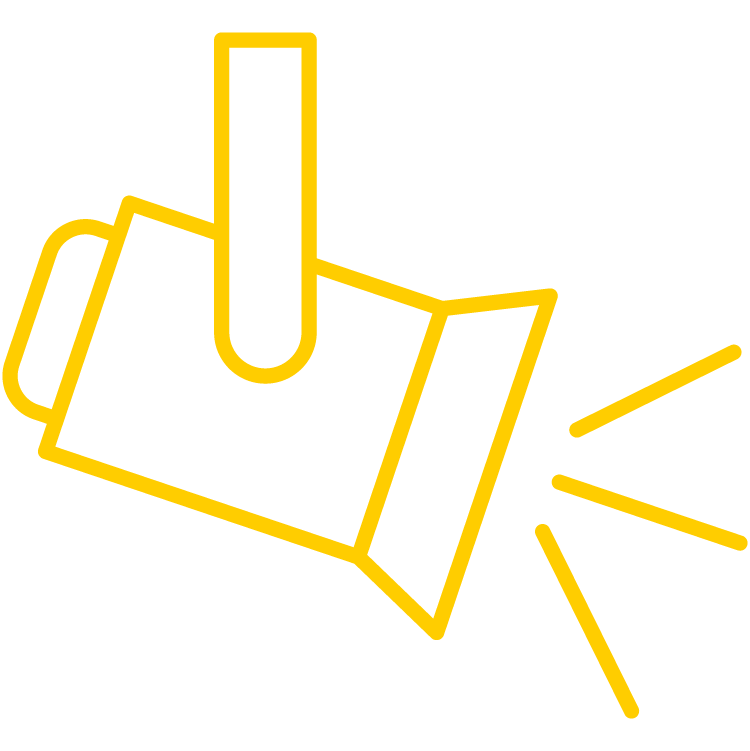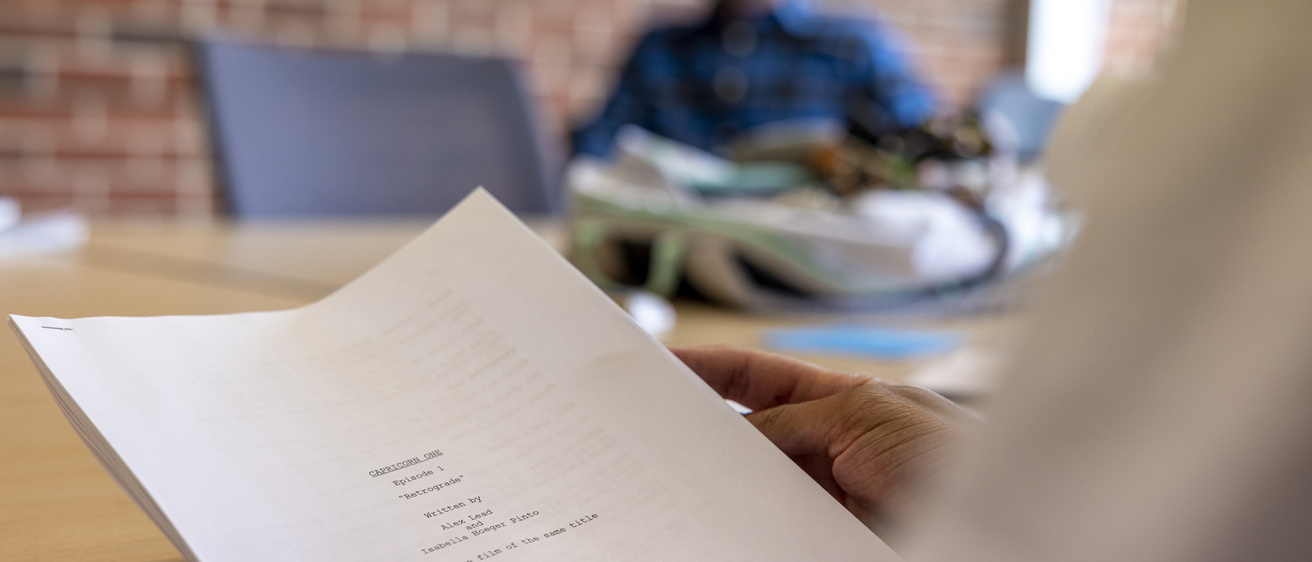Main navigation
Courses
The Magid Center offers these Writers' Room courses:
WRIT:1325 A screening-based course in which students develop skills in television script writing, structural analysis, and story craft by conducting an in-depth review of a season of a television show; includes instruction and class visits by acclaimed industry insiders.
WRIT:3325 An Experiential learning class where students gain first-hand experience as part of a traditional television writers' room—accepted students select material and show topics, pitch ideas, collaboratively breaking story, and write and workshop scripts for a limited series television show of student's choosing; includes instruction and class visits by acclaimed industry insiders.
WRIT:4325 In this advanced level course, students will work individually to craft their own pilot for a TV show. Students will read sample pilot scripts from successful television shows, participate in screenings of exemplary TV pilot episodes, draft their own pilot episodes, and workshop their writing over the course of the semester. This course will also include visits from acclaimed industry insiders and working television writers. Each student will leave the class with a revised television pilot they have created. This course is restricted to students who have previously completed WRIT:3325, Iowa Writers' Room. Students interested in registering for in this course must follow the instructions under "Registration Information."
More classes are being developed and will be offered soon.

"This was literally the best class from my whole college career!"
"Every day coming into this class was exciting and rewarding, especially for all the teamwork that made it possible. I felt encouraged and enlightened by my instructors and peers throughout the entire semester."

Testimonials
To have someone who knows and has experience in the industry explain just how the process of writing a script and getting it to the screen works was extremely valuable, and if I could take this class every semester I probably would.
The masterclass-like structure allowed for a bigger conversation between the instructor
and the students to ask the questions that they needed. My peers and I had little fear seeking out answers from our instructor, which I believe was thanks to the laid back atmosphere created by Danny and David. For one of the few times in my college experience, I’ve seen students not want to leave as soon as class ended for David’s rich fountain of information.
I am extremely eager to sign up for this course again when it is offered next. I haven’t stopped thinking about the experience and the films that were shown. It truly opened my eyes to what’s possible in cinema and it has ignited a larger fire within me to pursue what I love and what I find world-changing. Cinema is truly a lens in which to view the world and therefore, I believe that what audiences view through the frame can be influential to how they behave and think. This is why I am excited to enter the world of film so I can be a part of that influence.
For me, the advantages of a masterclass structure is having an experienced professional who loves their craft have the chance to teach students exactly what they want and how they want. They’re not restricted to a syllabus or even talking points, and that freedom allows for a unique and adaptable experience for students.
I can wholeheartedly say this was the most rewarding, “nutritious” binge I’ve ever done. From this course, I gained in-depth knowledge of the film industry. While Hollywood routinely promotes movies that are visual effects fests with little substance, I felt at ease knowing that screenwriters like Dave Kajganich find a place to share character-driven stories on an international level.
As a Cinema and Screenwriting student here at the University of Iowa, I find that having these kinds of opportunities are very valuable in understanding the real world outside of regular writing courses and in getting to hear about the experience of someone who has entered into a creative line of work with screenwriting. I feel like I have gained a better understanding of how the process works beyond just sitting down and writing.
As someone who came to this course from a very different background than many of the other students, this was far and away the most interesting and unique class I have gotten to take part in. Unlike many of the writing or acting students in the class, I am actually a Finance and Cinema student who’s looking to get involved on the business end of the entertainment industry.
During the course, I felt like I was part of an ambitious and hopeful community of eager
learners. I even had the privilege of meeting acclaimed television and film writer and executive producer, David Kajganich. What made this experience truly exceptional was gaining insight into his personal perspectives, experiences, and vulnerabilities. The knowledge I acquired in this course has already had a significant impact on my current coursework and my interactions with colleagues and confidants. Moreover, my appreciation for cinematic productions has expanded exponentially, leading to a far more enjoyable experience when consuming art in this medium.
Getting anecdotes about how David was brought onto the project and interacted with Luca was so valuable to me. Those are the kind of things that I don’t really get to hear about in a normal screenwriting class. My understanding of how to develop characters and their relationships to one another had the most growth I think. The research that went into establishing these characters in this setting was striking and leads me to think more critically about the characters I am creating.
I really appreciated that Dave was so honest with us about how he completed three projects that he was not proud to be a part of before he began working with Luca Guadagnino. It was also highly informative to hear that Dave’s experience working with Luca is unusual in the sense that screenwriters usually are not given such a significant role in the film’s actual production, and that sometimes writers must push for what they believe is right for the project. When speaking on his career, he said something like, “It wasn’t that I wasn’t in the right place, it was that I hadn’t found the right people.” This small anecdote hit me instantly and is something I know I will carry with me going forward.
Mr. Kajganich's experience with correcting an actor's improvisational method in a non-combative way by discussing concerns with the director and script supervisor eased a lot of anxieties I have had surrounding my work and maintaining its message while also maintaining mutual, professional respect between those working on a given film. Emails read aloud to the class were particularly enlightening, one such case being the correspondence between himself and one of the studios helping to make the film. Hearing each note the studio had, Mr. Kajganich's reaction, and then the individual responses he gave felt extraordinarily helpful in reaching a deeper understanding of industry politics and how to navigate them.
I appreciate having learned a lot about the screenwriting process during this course. It was enlightening to see much thought go into each character and each interaction they share during the screenwriting process. It was also interesting to see how much was left on the cutting room floor and which elements of it ended up in the theatrical release after viewing both versions back-to-back.
Since the class had ended, I have caught myself using many of Kajganich’s characterization techniques in my own film classes, especially when it comes to characterization.
The quiet moments that we got with each character did so much for the story as a whole and that is definitely a lesson I will take with me in my writing is to never overlook the quiet moments that humanize the characters.
Here is one of the most pivotal moments I experienced. I stayed after class and was questioning you on what makes a script good. You briefly explained that I need to be scared of it, and that it isn't too good if it does not scare me. That completely changed the whole way I think of my writing. Unlike a lot of other teachers and professors, I understood what that meant, and I could relate to that. So, it was in a sense, very joyful, as I can firmly say this was my first encounter with a professional screenwriter. That two minute interaction just changed everything for me.
I have a better understanding that everything, even the shortest lines of dialogue, that I put in or take out of a script may completely change someone’s perception of it, and reflect my own values in storytelling. It’s an intimidating notion, but it makes me more excited to examine my own work and tell stories that are important to me.
I feel like I overall got to understand more on how the collaborative aspect played out since in scriptwriting classes it is often solo projects, and getting to see how the director, actors, sponsors, and even a background actor’s mouth all influenced the story that the script had both on and off the page was very helpful.
Learning how much a shot can completely change my understanding of a character and how deep my empathy can grow through a single look solidified the importance of editing in my mind. I will definitely consider this the next time I am looking for an editor and will take into account when I am directing.
I think it really put into perspective just how much love is required for a single script. I am a victim of first-draft syndrome, meaning I finish something and that’s it from me, but I think seeing how many changes the script went through and the obstacles from Tilda Swinton and the studios really made me re-evaluate this ideology. It also made me realize how much of a team-oriented profession screenwriting can be.
After watching La Piscine, and taking this class, I've noticed how differently I observe things like acting, scripts, dialogue, and plot. The past few movies I’ve watched, I’ve kept an eye on things like that, and questioned why the directors or actors went that specific stylistic route, or why the writer wrote that line of dialogue instead of a different one.
For me, the best moments in the course were when we got to listen to Dave’s anecdotes about getting the job, the preliminary conversations he had with Luca about the characters, the email exchanges between Dave, Luca, and the Fox Searchlight producers, etc. This is what particularly draws me to a course like this, access to the inner workings of the screen writer job. I wouldn’t alter anything particular in the course, but I think these moments of personal insight are what make it a hit.
Hearing how David Kajganich had to constantly change and adapt parts of the script made me realize the reality of working professionally. As someone who is going to pursue aspects of filmmaking, this was valuable information, along with all the content in the course itself.
Since this was my first real film class, being able to gain a sense of time, scope, and role of a screenwriter working on a movie start to finish was most valuable. I hadn’t realized how many versions a script went through from director/screenwriter early conversations to different colored pages on set to postproduction audio direct recording. Bits of advice like authors need to move past judging their characters to loving/understanding parts of them made me want to spend more time with my characters before I start writing.
One aspect that really stuck out to me was how much Marianne’s character had to change because her actress didn’t want a large speaking role. It was amazing to see how such an important area of dialogue could be completely removed while still maintaining the original spirit of the story, and I don’t know if I could’ve done that for a piece I worked on. Realizing that gave me extra preparation for if a similar thing would happen to me in my career.
I remember having a conversation at one point, asking Kajganich whether throwing out lines was hard for him, but he said it was only hard if it was absolutely essential to the movie; he indicated that was rare and that the more important thing was to keep the soul of the movie rather than individual lines. This was influential for me because I feel like there’s this romanticization of overnight sensations and virality and I often struggle with perfectionism, so knowing that great films often do take time to be made is comforting and inspiring. I loved that we were able to ask Kajganich questions on anything we wanted ranging from casting processes to revision to whether there was much improvisation in the film (there wasn’t).
I remember jotting down in my notes after one of the sessions; David mentioned, don’t let your characters be above or below the love of God. That is a phrase that I’ll be taking with me, in both my poetry and screenwriting. Personally, for my own work, I feel as though I have been so fixated on cultivating the most poetic scenes and moments instead of fully understanding my characters and the spaces in which they are occupying. Working and prioritizing that process first will make the characters believable.
I really enjoyed this class and all its moments, I hope “The Big Binge” can go on for another year. Thank you so much!
Because I typically engage in playwriting and poetry, it was so interesting to see what writing is like for film and television, rather than the stage. I knew of some differences, like how much a script can change as shooting begins. Although the playwright may make changes during the beginning of rehearsals, there is typically a script-freeze date and the director and actors typically cannot make changes without approval from the playwright. However, I realized there are some similarities to the live performance and the recorded experience. For example, if an actor makes a change onstage or forgets a line and needs to adlib, we obviously cannot go back and fix it. I assumed film had an advantage over us in that they can keep re-shooting, so it was interesting to hear how some things get missed during shooting, which leads to changes that you are unable to remove from the film, such as the eye drops in the tea. It’s comforting, in a way, to know that despite our differences in medium we still have commonalities.
